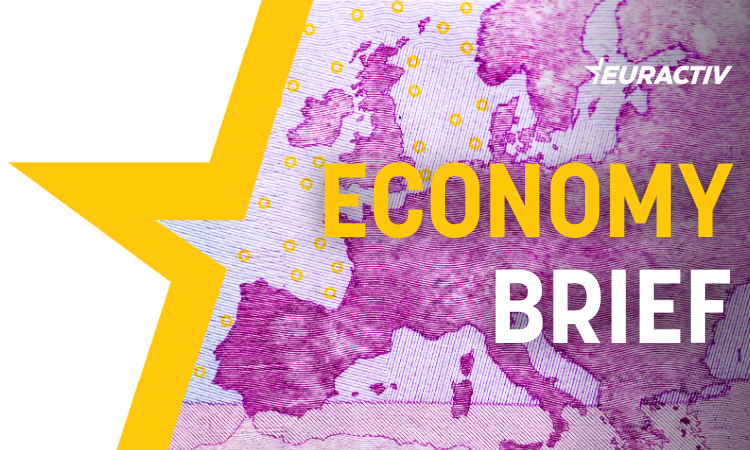
Welcome to EURACTIV’s weekly Economy Brief. You can subscribe to the newsletter here.
Economists see the European approach to building climate-friendly industries as “superior” to the US subsidy spree. But politicians have other priorities – and are starting to grumble.
For more than a year, European companies have cited the USA’s “Inflation Reduction Act” as the reason why they too should receive additional taxpayer money in the form of subsidies. Now, French and German economists have had enough.
In a rather surprising statement, the official council of Franco-German economic advisors has stressed that the EU’s green industrial policy is “clearly a superior approach” compared to the US subsidies and their discriminatory “Buy American” mandate.
But wait, there is a European approach to green industrial policy?
For months, we have been told that no such thing exists. France’s Economy Minister Bruno Le Maire said two weeks ago that it was “high time France and Germany agree on a joint industrial strategy” and that there was “not a single day to lose”.
Over this time, the few people that make up the “European public” – including this publication – have slammed Brussels for not finding a strong response to the US subsidy spree.
But there is a European Green Industrial Policy, of course.
It’s called the Emissions Trading System (ETS) – coincidentally also the EU’s flagship climate policy – and it is redirecting money from CO2-intensive industries towards green technologies.
The beauty of the ETS is that this money does not just come from the treasury, but from the industry sectors themselves, thereby further incentivising for them to phase out dirty production quickly, making investments into green tech doubly worthwhile.
But while this is the beauty of the European approach, it’s also a beast.
It will, by design, make businesses operating in traditional industries less lucrative, which will force them to shut down production sites – one after the other. Whether this comes in a predictable and just manner does not matter for the ETS to work – but it certainly is of politicians’ and workers’ concern.
ETS-induced price increases also provoke industry pushback, of course, whereas a subsidy programme like the IRA is welcomed with open arms.
So while economists call this approach “superior”, politicians are starting to grumble – and a potential roll-back of green policies in the next election cycle looks more and more likely.
A way to go on the ETS
Also good to remember is that the phase where the ETS hits hard has not actually begun – as of now, we are still in the phase that ETS chief negotiator Peter Liese (EPP) called “breathing space” for traditional industries, where they continue to get many of their emission allowances for free.
What is more, carbon prices will make a problem worse that in the long run might have an even bigger impact than the IRA’s subsidies: The gap between European and American energy prices. Already today, the ETS increases the price of electricity, and will also do so for oil and gas in the future.
“That is a problem that has not really been solved yet,” Monika Schnitzer, head of the German Council of Economic Experts – and co-author of the report on European superiority – told Euractiv. But this was “a discussion that has to be had anyway: How do we deal with it when we use a taxation system, the carbon price, but other countries do not do that?” she said.
The EU’s new carbon border tax would only solve parts of the problem, as it does not cover European exports to other countries, which could therefore lose out to products produced without a carbon price, she said. Also, it only applies to a select group of products so far.
“That is why, of course, it should always be linked to conducting international negotiations. Especially with our important trading partners, we should agree on a common approach,” Schnitzer said.
“But that is not easy, because not everyone wants a CO2 price,” she admitted, referring to the US where carbon pricing is facing strong resistance.
Alternatively, the EU could try to change WTO rules in order to be allowed to subsidise exports which are faced with the burden of European carbon pricing.
But “I don’t know what is more unrealistic: convincing the US to do a climate club with us and introduce CO2 prices – or reforming the WTO so that we could reimburse our exporters for the CO2 tax. This would also need the support of the US,” she said.
“Both are very unrealistic. But what can you do,” Schnitzer added.
So while economists continue to advocate for an efficient and non-confrontational approach to industrial policy, politicians seem to be ever more willing to ignore their advice (or “obsolete dogmas”, as France’s Le Maire calls it) – and potentially the WTO’s rules.
33 years after reunification, the devide between Eastern Germany and the rest of Germany persists, especially if you look at the wealth gap.
The map below shows the median wealth of each of the four German regions: North, West, South, and East. Don’t get confused by the individual states on the map, the data is only calculated for the entire region, not for the individual states.
The differences are stark, especially between the rich South of Germany with a median wealth of €184900 and the East with a median wealth of €43400. Meanwhile, the German government is divided over what to do about it, as Jonathan Packroff reports.
You can find all previous editions of the Economy Brief Chart of the week here.
Dombrovskis sets out more hawkish position in China: In a speech at Tsinghua University in Beijing on 25 September 2023, the EU Commission’s executive vice-president Valdis Dombrovskis criticised China for failing to condemn Russia’s invasion of Ukraine and accused the Chinese government for having created “a more politicised business environment” to the detriment of European companies. “The lack of reciprocity and level playing field from China, coupled with wider geopolitical shifts, has forced the EU to become more assertive,” he said.
EU and China set up Working Group on Financial Regulation: Dombrovskis was in China for the 10th EU-China High-Level Economic and Trade Dialogue, during which the two trade partners set up a new working group on financial regulation that should foster investment in financial markets, ensure cooperation in sustainable finance and improve rules for the ICT infrastructure for the financial sector.
EU-US summit will take place on 20 October in Washington DC: The EU and the US agreed on 20 October as the date when the President of the European Council Charles Michel and the President of the EU Commission Ursula von der Leyen will meet President Joe Biden in the US capital. This is only 11 days ahead of the deadline of 31 October when the EU and the US will have to have decided on an arrangement on green steel and aluminium to prevent Trump-era tariffs to snap back into place.
Call for host city of new EU Anti-Money Laundering Authority (AMLA) opened: Since yesterday (28 September), potential host cities can submit their applications to host the new authority that is being set up as part of a set of measures against money laundering that are currently being negotiated between the Parliament and the Council. Paris, Madrid, Vienna, and Frankfurt have already announced their intention to host the new AMLA. As has Vilnius, with a rather bizarre advertising video. For the first time in the selection process for a host city of an EU agency, the process will follow the ordinary legislative procedure, meaning that the Parliament should have as much power over the decision as the Council.
The euro area labour force: recent developments and drivers.
The ususal suspects: Offender origin, media reporting and natives’ attitudes towards immigration.
The effects of mandatory profit-sharing on workers and firms: Evidence from France.
[Edited by Nathalie Weatherald/János Allenbach-Ammann]







